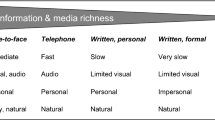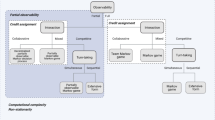Abstract
In automatic negotiation, intelligent agents try to reach the best deal possible on behalf of their owners. In previous studies, opponent modeling of a negotiator agent has been used to tune the final bid out of a group of bids chosen by the agent’s strategy. In this research, a time-based bidding strategy has been introduced, which uses the opponent model to concede more adaptively to the opponents, thereby achieving an improved utility, social welfare, and fairness for the agent. By modeling the preference profile of the opponent during the negotiation session, this strategy sets its concession factor proportional to the model. Experiments show that in comparison to state-of-the-art agents, this agent makes better agreements in terms of individual utility and social welfare in small and medium-sized domains and can, in some cases, increase the performance up to 10%. The proposed agent successfully gets the deal up to 37% closer to best social bids in terms of distance to the Pareto frontier and the Nash point. An implementation based on the proposed strategy was used in an agent called AgreeableAgent, which participated in the international ANAC 2018 and won first place in individual utility rankings.










Similar content being viewed by others
Data availability
The results of running negotiation sessions are available in CSV format files. Furthermore, domains and preference profiles used in the experimental results are available in the repository of Genius 9.1.6.
References
Chakraborty S, Baarslag T, Kaisers M (2020) Automated peer-to-peer negotiation for energy contract settlements in residential cooperatives. Appl Energy 259:114173
Chen B, Cheng HH (2010) A review of the applications of agent technology in traffic and transportation systems. Intelligent Transportation Systems, IEEE Transactions on 11(2):485–497
Messina F, Pappalardo G, Santoro C, Rosaci D, Sarné GML (2016) A multi-agent protocol for service level agreement negotiation in cloud federations. International Journal of Grid and Utility Computing 7(2):101–112
Baarslag T et al Computers that negotiate on our behalf: Major challenges for self-sufficient, self-directed, and interdependent negotiating agents. In International Conference on Autonomous Agents and Multiagent Systems. 2017. Springer
Wooldridge M (2009) An introduction to multiagent systems. John Wiley & Sons
Faratin P, Sierra C, Jennings NR (1998) Negotiation decision functions for autonomous agents. Robot Auton Syst 24(3):159–182
Baarslag, T., et al. (2016) Optimal non-adaptive concession strategies with incomplete information, in Recent Advances in Agent-based Complex Automated Negotiation. Springer. p. 39–54
Baarslag, T., et al. (2012) The first automated negotiating agents competition (ANAC 2010), in New Trends in agent-based complex automated negotiations. Springer. p. 113–135
Jonker, C.M., et al. Automated negotiating agents competition (ANAC). in AAAI. 2017
Baarslag T, Aydoğan R, Hindriks KV, Fujita K, Ito T, Jonker CM (2015) The automated negotiating agents competition, 2010–2015. AI Mag 36(4):115–118
Baarslag, T., et al. (2014) Decoupling negotiating agents to explore the space of negotiation strategies, in Novel Insights in Agent-based Complex Automated Negotiation. Springer. p. 61–83
Lin R, Kraus S, Baarslag T, Tykhonov D, Hindriks K, Jonker CM (2014) Genius: an integrated environment for supporting the design of generic automated negotiators. Comput Intell 30(1):48–70
Baarslag T et al (2015) Learning about the opponent in automated bilateral negotiation: a comprehensive survey of opponent modeling techniques. Auton Agent Multi-Agent Syst:1–50
Mirzayi S, Taghiyareh F, Nassiri-Mofakham F (2017) The effect of online opponent modeling on utilities of agents in bilateral negotiation. In Artificial Intelligence and Signal Processing. Iran
Kawaguchi S, Fujita K, Ito T (2011) Compromising strategy based on estimated maximum utility for automated negotiation agents competition (ANAC-10). In International Conference on Industrial, Engineering and Other Applications of Applied Intelligent Systems. Springer
Ji S-j et al (2014) A one-shot bargaining strategy for dealing with multifarious opponents. Applied Intelligence 40(4):557–574
Baarslag, T., et al. (2013) Predicting the performance of opponent models in automated negotiation. In Web Intelligence (WI) and Intelligent Agent Technologies (IAT), 2013 IEEE/WIC/ACM International Joint Conferences on. IEEE
Faratin P, Sierra C, Jennings NR (2002) Using similarity criteria to make issue trade-offs in automated negotiations. Artificial Intelligence 142(2):205–237
Hindriks K, Tykhonov D (2008) Opponent modelling in automated multi-issue negotiation using bayesian learning. In Proceedings of the 7th international joint conference on Autonomous agents and multiagent systems-Volume 1. International Foundation for Autonomous Agents and Multiagent Systems
Hindriks K, Jonker CM, Tykhonov D (2009) The benefits of opponent models in negotiation. In Proceedings of the 2009 IEEE/WIC/ACM International Joint Conference on Web Intelligence and Intelligent Agent Technology-Volume 02. IEEE Computer Society
Zafari F, Nassiri-Mofakham F (2016) POPPONENT: highly accurate, individually and socially efficient opponent preference model in bilateral multi issue negotiations. Artif Intell 237:59–91
Amini M, Fathian M, Ghazanfari M (2020) A BOA-based adaptive strategy with multi-party perspective for automated multilateral negotiations. Appl Intell, p. 1–31
Yavuz COB, Süslü Ç, Aydogan R (2020) Taking inventory changes into account while negotiating in supply chain management. in ICAART (1)
Baarslag T, Hindriks K, Jonker C (2011) Towards a quantitative concession-based classification method of negotiation strategies. In International Conference on Principles and Practice of Multi-Agent Systems. Springer
Papaioannou IV, Roussaki IG, Anagnostou ME (2008) Neural networks against genetic algorithms for negotiating agent behaviour prediction. Web Intelligence and Agent Systems: An International Journal 6(2):217–233
Papaioannou I, Roussaki I, Anagnostou M (2011) Multi-modal opponent behaviour prognosis in e-negotiations. In International Work-Conference on Artificial Neural Networks. Springer
Aydoğan R, Baarslag T, Hindriks KV, Jonker CM, Yolum P (2015) Heuristics for using CP-nets in utility-based negotiation without knowing utilities. Knowl Inf Syst 45(2):357–388
Aydoǧan R, Yolum P (2010) Effective negotiation with partial preference information. In Proceedings of the 9th International Conference on Autonomous Agents and Multiagent Systems: volume 1-Volume 1. International Foundation for Autonomous Agents and Multiagent Systems
Baarslag T, Kaisers M (2017) The value of information in automated negotiation: A decision model for eliciting user preferences. In Proceedings of the 16th Conference on Autonomous Agents and MultiAgent Systems. International Foundation for Autonomous Agents and Multiagent Systems
Tsimpoukis D et al (2019) Automated negotiations under user preference uncertainty: a linear programming approach. Springer International Publishing, Cham
Ito T, et al. (2011) New trends in agent-based complex automated negotiations. Vol. 383. Springer
Marsa-Maestre, I., et al. (2014) Novel insights in agent-based complex automated negotiation. Vol. 535. Springer
Gal Y.a, et al. (2005) Colored trails: a formalism for investigating decision-making in strategic environments. in Proceedings of the 2005 IJCAI workshop on reasoning, representation, and learning in computer games
Cao M, Luo X, Luo X(R), Dai X (2015) Automated negotiation for e-commerce decision making: a goal deliberated agent architecture for multi-strategy selection. Decis Support Syst 73:1–14
Shoham Y (1993) Agent-oriented programming. Artif Intell 60(1):51–92
Bellifemine FL, Caire G, Greenwood D (2007) Developing multi-agent systems with JADE. Vol. 7. John Wiley & Sons
Gutknecht O, Ferber J (2000) Madkit: a generic multi-agent platform. In Proceedings of the fourth international conference on Autonomous agents. ACM
Chauhan D, Baker AD (1998) Developing coherent multiagent systems using jafmas. In Proceedings International Conference on Multi Agent Systems (Cat. No. 98EX160). IEEE
Zeng D, Sycara K (1998) Bayesian learning in negotiation. International Journal of Human-Computer Studies 48(1):125–141
Guttman RH, Maes P (1998) Agent-mediated integrative negotiation for retail electronic commerce. In International Workshop on Agent-Mediated Electronic Trading. Springer
Lo G, Kersten GE (1999) Negotiation in electronic commerce: integrating negotiation support and software agent technologies
Wu S, Kersten G, Benyoncef M (2006) INSS-a new approach in designing Web-based negotiation support systems. In Proceedings of the Montreal Conference on e-Technologies. Citeseer
Kersten GE, Lo G (2003) Aspire: an integrated negotiation support system and software agents for e-business negotiation. International Journal of Internet and Enterprise Management 1(3):293–315
Mirzayi S, Taghiyareh F, Kazemi SMH (2018) IQSon: a context-aware negotiator agent with enhanced utility and decision making speed. In 2018 9th International Symposium on Telecommunications (IST).. IEEE
Lomuscio AR, Wooldridge M, Jennings NR (2003) A classification scheme for negotiation in electronic commerce. Group Decis Negot 12(1):31–56
Marsa-Maestre I, Klein M, Jonker CM, Aydoğan R (2014) From problems to protocols: towards a negotiation handbook. Decis Support Syst 60:39–54
Fatima SS, Wooldridge M, Jennings NR (2002) Multi-issue negotiation under time constraints. In Proceedings of the first international joint conference on Autonomous agents and multiagent systems: part 1. ACM
Kraus S (2001) Strategic negotiation in multiagent environments. MIT press
Vidal JM (2006) Fundamentals of multiagent systems.
Albrecht SV, Stone P (2018) Autonomous agents modelling other agents: a comprehensive survey and open problems. Artif Intell 258:66–95
Baarslag T, et al. (2012) Measuring the performance of online opponent models in automated bilateral negotiation. In Australasian Joint Conference on Artificial Intelligence. Springer
Baarslag T, et al. (2014) The significance of bidding, accepting and opponent modeling in automated negotiation. in ECAI
Mirzayi S, Taghiyareh F (2019) Opponent modeling in agents’ negotiations using issues’ frequency in 10th Conference on Information and Knowledge Technology (IKT2019). Tehran
Zafari F, Nassiri-Mofakham F, Hamadani AZ (2015) Dopponent: A socially efficient preference model of opponent in bilateral multi issue negotiations. Journal of Computing and Security. 1(4)
Baarslag T, Hindriks KV (2013) Accepting optimally in automated negotiation with incomplete information, in AAMAS2013: 2013 International Conference on Autonomous Agents and Multi-agent Systems. United States. p. 715–722
Dignum, F. and U. Cortés, Agent-mediated electronic commerce III: current issues in agent-based electronic commerce systems. 2003: Springer
Hindriks K, Jonker CM, Tykhonov D (2007) Negotiation dynamics: Analysis, concession tactics, and outcomes. In 2007 IEEE/WIC/ACM International Conference on Intelligent Agent Technology (IAT'07). IEEE
Rao AS, Georgeff MP (1991) Modeling rational agents within a BDI-architecture. KR 91:473–484
Mori A, Ito T (2017) Atlas3: a negotiating agent based on expecting lower limit of concession function, in Modern Approaches to Agent-based Complex Automated Negotiation. Springer. p. 169–173
Aydoğan R, et al. (2018) ANAC 2017: Repeated multilateral negotiation league. In International Workshop on Agent-Based Complex Automated Negotiation. Springer
Hindriks KV, Tykhonov D (2010) Towards a quality assessment method for learning preference profiles in negotiation, in Agent-mediated electronic commerce and trading agent design and analysis. Springer. p. 46–59
Jonker CM, Ito T (2020) ANAC 2018: Repeated multilateral negotiation league. in Advances in Artificial Intelligence: Selected Papers from the Annual Conference of Japanese Society of Artificial Intelligence (JSAI 2019). Springer Nature
Khosravimehr Z, Nassiri-Mofakham F (2017) Pars agent: hybrid time-dependent, random and frequency-based bidding and acceptance strategies in multilateral negotiations, in Modern Approaches to Agent-based Complex Automated Negotiation. Springer. p. 175–183
Kawaguchi S, Fujita K, Ito T (2012) AgentK: Compromising strategy based on estimated maximum utility for automated negotiating agents, in New Trends in Agent-Based Complex Automated Negotiations. Springer. p. 137–144
Funding
The authors did not receive support from any organization for the submitted work.
in the subject matter or materials discussed in this manuscript.
Author information
Authors and Affiliations
Contributions
All authors made substantial contributions to the design of the work, or the acquisition, analysis, or interpretation of data, or the creation of new software used in the work. Authors drafted the work or revised it critically for important intellectual content. Authors approved the version to be published; and agree to be accountable for all aspects of the work in ensuring that questions related to the accuracy or integrity of any part of the work are appropriately investigated and resolved.
Corresponding author
Ethics declarations
Conflicts of interest/competing interests
All authors certify that they have no affiliations with or involvement in any organization or entity with any financial interest or non-financial interest.
Additional information
Publisher’s note
Springer Nature remains neutral with regard to jurisdictional claims in published maps and institutional affiliations.
Rights and permissions
About this article
Cite this article
Mirzayi, S., Taghiyareh, F. & Nassiri-Mofakham, F. An opponent-adaptive strategy to increase utility and fairness in agents’ negotiation. Appl Intell 52, 3587–3603 (2022). https://doi.org/10.1007/s10489-021-02638-2
Accepted:
Published:
Issue Date:
DOI: https://doi.org/10.1007/s10489-021-02638-2




